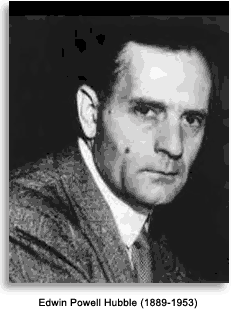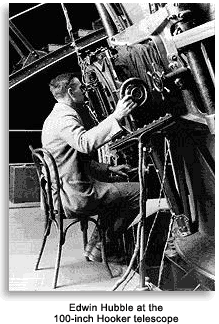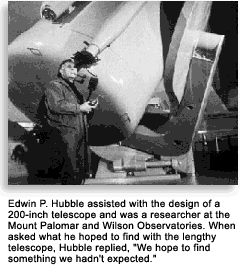Edwin Hubble developed several original concepts that have advanced the science of astronomy, but his first career choice was law. Fortunately for science, he abandoned law and became an astronomer whose achievements won the admiration and gratitude of Albert Einstein. The Hubble Space Telescope was named in his honor.
 Edwin Powell Hubble was born in Marshfield, Missouri, on November 29, 1889. In 1898, his family moved to Chicago, Illinois, where he attended high school and set the Illinois State high-jump record. While still young, Hubble was fascinated by science and mysterious new worlds. He read the works of Jules Verne (20,000 Leagues Under the Sea, From the Earth to the Moon), and Henry Rider Haggard (King Solomon's Mines). At the University of Chicago, he combined athletics with academics and earned a bachelor's degree in mathematics and astronomy in 1910. He attended Oxford University, on a Rhodes Scholarship, where he studied law. After returning to the United States, he set up a law practice, but became disenchanted with his chosen profession. He switched back to astronomy, then earned his doctorate from Chicago in 1917.
Following military service in World War I, Hubble accepted a position at the Mount Wilson Observatory in California. There he took photographs using the 100-inch reflecting Hooker telescope, with which he demonstrated that there is a vastly larger setting outside the Milky Way. He proved that the Milky Way existed among millions of other galaxies that make up a larger setting (the cosmos). Thanks to the discovery of the cosmos, Hubble is said to be the founder of the science of cosmology.
Edwin Powell Hubble was born in Marshfield, Missouri, on November 29, 1889. In 1898, his family moved to Chicago, Illinois, where he attended high school and set the Illinois State high-jump record. While still young, Hubble was fascinated by science and mysterious new worlds. He read the works of Jules Verne (20,000 Leagues Under the Sea, From the Earth to the Moon), and Henry Rider Haggard (King Solomon's Mines). At the University of Chicago, he combined athletics with academics and earned a bachelor's degree in mathematics and astronomy in 1910. He attended Oxford University, on a Rhodes Scholarship, where he studied law. After returning to the United States, he set up a law practice, but became disenchanted with his chosen profession. He switched back to astronomy, then earned his doctorate from Chicago in 1917.
Following military service in World War I, Hubble accepted a position at the Mount Wilson Observatory in California. There he took photographs using the 100-inch reflecting Hooker telescope, with which he demonstrated that there is a vastly larger setting outside the Milky Way. He proved that the Milky Way existed among millions of other galaxies that make up a larger setting (the cosmos). Thanks to the discovery of the cosmos, Hubble is said to be the founder of the science of cosmology.
 While devising a classification system for the various galaxies he observed, Hubble noted shifts in the spectrum of light that indicated those galaxies were moving away from each other at a rate proportional to the distance between them. From those observations, he was able to formulate Hubble's Law in 1929, which holds that the universe is much older than the solar system and also is expanding. Albert Einstein, whose general theory of relativity predicted that space was curved by gravity and that the universe might be expanding or contracting, visited Hubble in 1931 to thank him for the support Hubble's Law gave his theory. Hubble's Law was born out of studies made by Hubble and his assistant Milton Humason, while measuring the distances to receding nebulae. The law states that the farther away a galaxy (or nebulae) is from Earth, the faster it is racing away. Illustrating that the cosmos was continuously expanding, Hubble's discovery forced Einstein to acknowledge and retract what Einstein called “the greatest blunder of my life,” which was to doubt his earlier belief that the cosmos was either expanding or contracting.
After the visit from Einstein, Hubble published his book The Realm of the Nebulae on his findings. The book's publication in 1936 cemented his reputation as one of the greatest astronomers of the time. Hollywood starlets and tourists flocked to see the observatory.
While devising a classification system for the various galaxies he observed, Hubble noted shifts in the spectrum of light that indicated those galaxies were moving away from each other at a rate proportional to the distance between them. From those observations, he was able to formulate Hubble's Law in 1929, which holds that the universe is much older than the solar system and also is expanding. Albert Einstein, whose general theory of relativity predicted that space was curved by gravity and that the universe might be expanding or contracting, visited Hubble in 1931 to thank him for the support Hubble's Law gave his theory. Hubble's Law was born out of studies made by Hubble and his assistant Milton Humason, while measuring the distances to receding nebulae. The law states that the farther away a galaxy (or nebulae) is from Earth, the faster it is racing away. Illustrating that the cosmos was continuously expanding, Hubble's discovery forced Einstein to acknowledge and retract what Einstein called “the greatest blunder of my life,” which was to doubt his earlier belief that the cosmos was either expanding or contracting.
After the visit from Einstein, Hubble published his book The Realm of the Nebulae on his findings. The book's publication in 1936 cemented his reputation as one of the greatest astronomers of the time. Hollywood starlets and tourists flocked to see the observatory.
 During World War II, Hubble wanted to contribute to the war effort. Not too old to join the active military, Hubble provided his services as the head of ballistics for the Aberdeen Proving Ground. Following the war, Major Hubble was given the Medal of Merit for his contribution. He returned to the Wilson observatory. Hubble was instrumental in the design and construction of the 200-inch telescope installed at Mount Palomar Observatory and enjoyed the honor of being the first to use it. The Hale telescope was four times the size of the Hooker and would remain the world's largest telescope for four decades. He remained active in research until his death from a cerebral thrombosis (blood clot) on September 20, 1953.
Hubble's fascination with what lies beyond, and his passion for discovery may be summed up in his remark,
During World War II, Hubble wanted to contribute to the war effort. Not too old to join the active military, Hubble provided his services as the head of ballistics for the Aberdeen Proving Ground. Following the war, Major Hubble was given the Medal of Merit for his contribution. He returned to the Wilson observatory. Hubble was instrumental in the design and construction of the 200-inch telescope installed at Mount Palomar Observatory and enjoyed the honor of being the first to use it. The Hale telescope was four times the size of the Hooker and would remain the world's largest telescope for four decades. He remained active in research until his death from a cerebral thrombosis (blood clot) on September 20, 1953.
Hubble's fascination with what lies beyond, and his passion for discovery may be summed up in his remark,
"At the last dim horizon, we search among ghostly errors of observations for landmarks that are scarcely more substantial. The search will continue. The urge is older than history. It is not satisfied and it will not be oppressed."